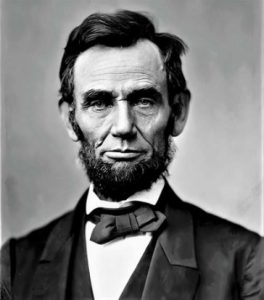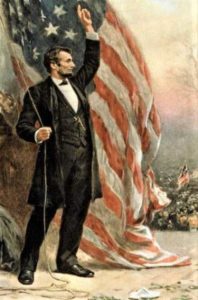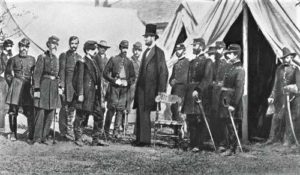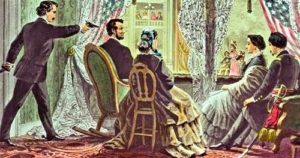Abraham Lincoln was born (February 12, 1809, near Hodgenville, Hardin County, died on April 15, 1865, in Washington, DC) served as the 16th President of the United States from 1861 to 1865. He was first in selected 1860, the re-election succeeded in 1864. He was the first in the Republican Party ranks and the first to be assassinated.
His presidency is considered to be one of the most important in the history of the United States: the election of the opponent of slavery prompted seven, and later four, of the slave-holding southern states to withdraw from the Union and form their own confederation, the Confederate States of America.
Lincoln led the remaining northern states through the resulting civil war. He pushed through the restoration of the Union and successfully abolished slavery in the United States. Under his government, the country paved the way for a centrally governed, modern industrial state and created the basis for his rise to world power in the 20th century.
Early Years of Abraham Lincoln
Abraham Lincoln was born into a family of Quaker colonists. During his childhood and youth, marked by the poverty of his family, he toured the Mississippi and lived closely with the subhuman conditions suffered by black slaves.
He was twenty-three years old when he left the farm where he worked to fight as a private soldier in the war against the Indians. Meanwhile, he undertook his self-taught training and by 1836 he managed to obtain a law degree.
Two years earlier, his anti-slavery attitude had led him to intervene in politics, which earned him his election as Illinois deputy for the period 1834-1842. Thanks to his defense of better living conditions for blacks and his oratory skills, he achieved great popularity throughout the state.
In 1846 Lincoln became the head of the Whig Party, and as a member of the federal Congress, he supported Washington’s abolitionists.
That same year the war against Mexico broke out (1846-1848); the overwhelming North American victory supposed the definitive annexation of Texas and the incorporation of Alta California, New Mexico, northern Sonora, Coahuila, and Tamaulipas to the United States, while the Mexicans lost half of their national territory.
Abraham Lincoln had strongly opposed the war from the start; the favorable outcome of the same made him lose many votes, and he failed in the senatorial elections of 1849.

Disappointed, he retired from politics and for six years worked as a solicitor. Towards the end of this retreat, Lincoln remained a provincial lawyer and politician, certainly prestigious in his state, but almost unknown outside of Illinois.
Nothing foreshadowed that, another seven years later, he would be elected President of the United States, much less that his election was the trigger for the secession of the southern slave states and the beginning of a fratricidal war since his abolitionist ideology was realistic. and moderate.
Abraham Lincoln considered slavery as a social evil and was firmly convinced that it was necessary to prevent its spread by the American states. However, it did not intend to impose immediate abolition on the southern territories;
Abraham Lincoln Marriage with Mary Todd
In 1842, Abraham Lincoln married Mary Todd, who came from a wealthy Kentucky planter and slave owner family. This connection met with considerable resistance from the Todds since Lincoln had little wealth and his political views largely contradicted theirs.
A relative of Mary Lincoln, her brother-in-law Benjamin Hardin Helm, even became a general of the Confederate Army in the Civil War. He later fell in the battle of Chickamauga.
Abraham and Mary Lincoln were born four sons:
- Robert Todd Lincoln (born August 1, 1843, in Springfield, Illinois, died on July 26, 1926, in Manchester, Vermont)
- Edward “Eddie” Baker Lincoln (born March 10, 1846, in Springfield, Illinois, died on February 1, 1850, in Springfield, Illinois.)
- William “Willie” Wallace Lincoln (born December 21, 1850, in Springfield, Illinois, died on February 20, 1862, in Washington, DC)
- Thomas “Tad” Lincoln (born April 4, 1853, in Springfield, Illinois, died on July 16, 1871, in Chicago, Illinois).
So two children died in Lincoln’s lifetime, and only Robert reached adulthood. Like his father, he pursued a career as a lawyer and politician and was US Secretary of War from 1881 to 1885. The last direct descendant of Abraham Lincoln, Robert Todd Lincoln Beckwith, a great-grandson, died in 1985 at the age of 81.
Election as president
At the Republican Party National Convention of 1860, held in the city of Chicago, Lincoln faced several powerful Republican pre-candidates running for the party’s Presidential Candidacy; They were William H. Seward, Simon Cameron, Salmon P. Chase, and Edward Bates (apart from others less powerful).
All but one were active senators in the United States Congress, and two had been stated governors, but Lincoln’s charisma made up for his relative lack of experience and political weight. In the third vote of the Convention, held on May 16 In 1860, Lincoln defeated his party mates and became the party’s official candidate for the Presidency of the United States.
The Democratic Party was divided; Democrats from the Northern States ran the presidential candidacy of Stephen A. Douglas (the same man who had defeated Lincoln in the Senate campaign), while Democrats from the Southern States launched the presidential candidacy of John C. Breckinridge (who at that time he was Vice President of the United States).
The Constitutional Union Party launched a fourth presidential candidate, who was exiting John C. Bell. In the presidential elections of the 6 of November of 1860 Lincoln obtained 39.82% of the popular vote (1,865,908 votes); Douglas drew 29.46% (1,380,202 votes); Breckinridge obtained 18.10% (848,019 votes); and Bell got 12.62% (590,901 votes).
In short, the three Lincoln opponents had totaled nearly three million votes against the less than two million Lincoln; but in the Lincoln Electoral College, it had 180 Great Electors against 123 added by its opponents (152 were needed to win). So Lincoln was the winner and was elected president.
Presidency
Shortly after his election, the South made it clear that secession was inevitable. That greatly increased tension across the nation. And as president-elect, he survived an attempt of murder in Baltimore (Maryland), and February of 23, 1861 arrived secretly and in disguise to Washington.
Lincoln was ridiculed by the South for this apparently cowardly act, but security efforts could have been prudent. At Lincoln’s inauguration on March 4, 1861, the Turners They were Lincoln’s bodyguard corps, and an important garrison of Union troops was always present, ready to protect the President and the capital from a rebel invasion.

The objectives of his presidency were those of his party, the Republican, and who was the great heir of the Whig party, which had fallen out of favor.
It consisted of what Henry Clay had called the “American System”, and it was summarized in three points: A protectionist customs policy, “internal improvements”, that is, public investments in infrastructure, and finally an inflationary banking policy.
Protectionism favored the north, which voted overwhelmingly for the Republicans, and was detrimental to the south, fiefdom of the Democrats. The north was industrial, and imposing high customs limits foreign (mainly British) competition for manufactured goods.
This hurt the south, which had to buy them at a higher price. The increase in costs, moreover, could not pass them on to its exports, since it faced international competition. It also reduced the income of its customers.
The north, in addition, took advantage of the income of the customs (until the war between the States, the main source of income of the Federal Government), to make the “internal improvements”, which the south considered that they did not benefit it. The same thing happened with inflationary banking.
To carry out his program, the “American System,” he needed the union to be maintained. A divided country would ruin that scheme. That is why Lincoln always put marriage before any other consideration, including slavery.
The Civil War
The American Civil War (1861-1865), which became the bloodiest conflict on the continent since Napoleon’s military expeditions, caused thousands of deaths on both sides of the Mason-Dixon line, which separated the former allies from the north of southern compatriots.
President Abraham Lincoln tried to mediate between the northern and southern states and ended up entering a war that he tried to avoid until the end. The origin was the disputes over the slavery issue since the southern states did not want to renounce this ancient privilege.
Although Lincoln was a convinced opponent of the crackdown, union cohesion ended up being more important to him than the abolition of slavery. The war was a constant source of frustration for the President, and this occupied most of his time.
After repeated frustrations with General George Brinton McClellan, Lincoln made the decision to replace him with a radical and somewhat outrageous commander: General Ulysses S. Grant. He would apply his military knowledge and leadership skills to bring the Civil War to an end.
Before England, which depended on cotton from the southern states, influenced the recognition of the opposition confederation, Lincoln freed slaves in 1863 by proclamation.
When Richmond, Virginia, the Confederate capital, was finally captured, Lincoln went there to make the public gesture of sitting behind Jefferson Davis’s desk., who had been the president of the southern states throughout the war, to symbolically tell the nation that the President of the United States, and the American Constitution, had authority over all that land.

He was greeted in the city as a conquering hero by freed slaves, whose feelings were exemplified thus by an admirer: “I know that I am free because I have seen the face of Father Abraham and I have felt it.”
The reconstruction of the Union was a great weight on the presidential mind. He was determined to take a course that did not permanently alienate the old Confederate states.
Financial, Economic and Social Policy’s of Abraham Lincoln
President Lincoln’s politics quickly benefited from the increase in the money supply thanks to the discovery of the largest silver-metal deposit in history after the Bolivian Potosi, which saw the great fortunes of the lump build up in a few years ‘American West.
By 1862, several hundred small mining companies shared the deposit of Comstock Lode discovered three years earlier in Virginia City, Nevada, under the eyes of journalist Mark Twain, in full conquest of the West.
While the Southern States broadcast in Europea loan indexed to the value of cotton, taking advantage of the influence of the Parisian financial center, Lincoln prefers to develop American finance, when he is forced to borrow an arm’s length to equip the armies, with the help of a close friend, Jay Cooke (August 10, 1821 – February 8, 1905), which creates one of the first American investment banks, Jay Cooke & Co, to organize bond issues.
President Lincoln decides to carry out the reconstruction of the South very early on through social programs. In 1862 and 1864 he passed two successive laws to provide state support for the construction of the first transcontinental railways, completed in 1869, and providing work for demobilized soldiers.
The government also supported the Associated Press and the Western Union, by placing orders with them in the Washington Official Journal, leading to the creation by MidWest newspapers of a new Associated Press.
Sixty years later, president franklin Delano Roosevelt recalled this word from Abraham Lincoln: “The strongest bond of sympathy between men after labor relations must be that which unites workers of all Nations”. He is also in favor of increasing protectionist measures.
The Assassination of Abraham Lincoln
The assassination of Abraham Lincoln took place on April 14, 1865in Washington. The Sixteenth President of the United States, Abraham Lincoln, is shot dead while attending the performance of Tom Taylor’s play, Our American Cousin. At the theater Ford with his wife and two guests.
The murderer of Lincoln, the actor, and sympathizer of the cause Confederate John Wilkes Booth, recruited several accomplices, including Lewis Powell and George Atzerodt, whom he charged with the murder of Secretary of State William H. Seward and Vice-President Andrew Johnson, respectively.

Through this triple murder, Booth hopes to create chaos and overthrow the Union government. Despite Lincoln’s death, his plot fails: Powell assaults Seward, but the latter recovers from his injuries, and Atzerodt, panicked, flees from Washington without having seen Johnson.
The manhunt is organized by the army immediately after the attack. Powell is arrested on April 17 and Atzerodt the 20. Booth and one of his accomplices, David Herold, after fleeing the scene of their crime, find themselves in Maryland and manage to escape their pursuers until April 26.
Surrounded by the army, Herold surrenders, but Booth refuses and is shot. Many suspects are arrested, but ultimately it is seven men and a woman who are tried by a military court from May 9, 1865. June 30th, all were found guilty by the court, four of them were sentenced to death and executed by hanging, July 7, 1865.





